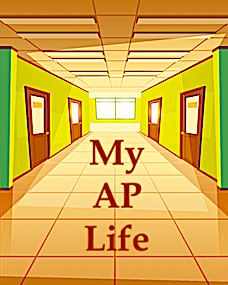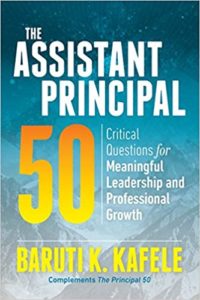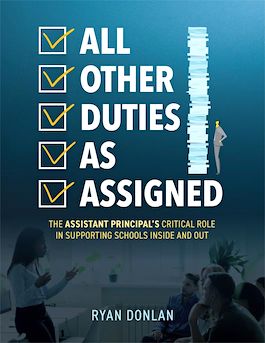No One Told Us How to Be Assistant Principals
A MiddleWeb Blog

You feel stuck between two worlds; some days you can’t seem to find your footing. And just when you begin to think you’re figuring this job out, something sideswipes you and seems to put you back at the starting line. (For example, helping run a school post-COVID, when the majority of your experience has been during COVID).
And let’s be real. Our educational leadership classes did nothing to prepare us for our role as APs. Most did a good job helping us understand what we would face in the lead role of a school – the principalship – but there was little or no preparation for the balancing act we would have to perform day in and day out as an assistant principal.
As we all know, most principals begin their leadership career as APs. Yet there is no course designed to help us deal with this job description: Everything the principal either dislikes or smartly realizes they have difficulty with.
Assistant Principal Training is Do-It-Yourself
When I graduated with my Master’s in Educational Leadership, I did not have a good understanding of what I would be required to accomplish as an Assistant Principal. After a few years in the job, I realized I needed to seek out professional development for myself. I found that help in the form of several books written by school leaders who understand the unique nature of the AP experience.
I truly feel that if my graduate program had included a focus on reading material like Baruti Kafele’s book The Assistant Principal 50, and Ryan Donlan’s book All Other Duties as Assigned (along with several other great AP preparation books), I would have had a better understanding of my AP role right from the start.
It seems obvious (now) to say that being an AP is necessary preparation for becoming a building principal. But teachers moving into administration for the first time need help unpacking the reality of that statement.

Embracing Our Management Role
While Kafele’s book helped me find my own purpose for being an AP, Dr. Donlan’s book helped me understand more fully what my role as an AP should be.
Donlan begins his book – subtitled The Assistant Principal’s Critical Role in Supporting Schools Inside and Out – with a simple statement: “Schools make all professions possible.” This is a powerful statement. And each of us at the school contributes uniquely to its power.
Donlan considers our contribution as assistant principals to be “akin to the Special Forces of education.” He advises us to stop thinking of the word “management” as a dirty word and reminds us that our primary role as an assistant principal is to “first…ensure proper management so that school leadership [as a whole] can flourish.”
This can be hard for many new APs to hear (it was hard for me as a former Instructional coach with a heart for curriculum and instruction). But we need to hear it, because in the end that is really what we do…we manage a lot of the day-to-day running of the building so that our principals can be more involved in the instructional running of the school.
This, of course, is not to say that we as APs aren’t involved in the instructional side of things. Donlan addresses this in chapters 9 and 10 when he advises on how we should help with teaching and learning in our buildings and with school improvement and accountability.
For teaching and learning, he recommends an instructional coach approach…get in there, observe, co-teach, model, and work with teachers to better understand their content, curriculum, and needs, while also helping them understand your expectations.
For school improvement, Donlan tells us that as assistant principals we need to “facilitate the meaningful use of data and story with [our] teachers, staff, and students.” In conjunction with our principals, we should be helping teachers learn how to use data effectively (what story does the data tell?) to move our students along the spectrum of academic growth.

His book helped me understand that although I may not always see it, I am a key part of the school engine and that in my role as an AP I have to ensure that I “understand people, power, and politics” while “being loyal and true to [myself].”
This delicate balancing act can (and will) cause many of us to question why we chose this role. I know I have at times. But it also allows us the chance to participate in all aspects of student learning – reaching more students and affecting so many more lives than we can in a single classroom.
So I say again…leadership is hard! But when you have good advice and you find the right tools, it is a very rewarding endeavor.


































